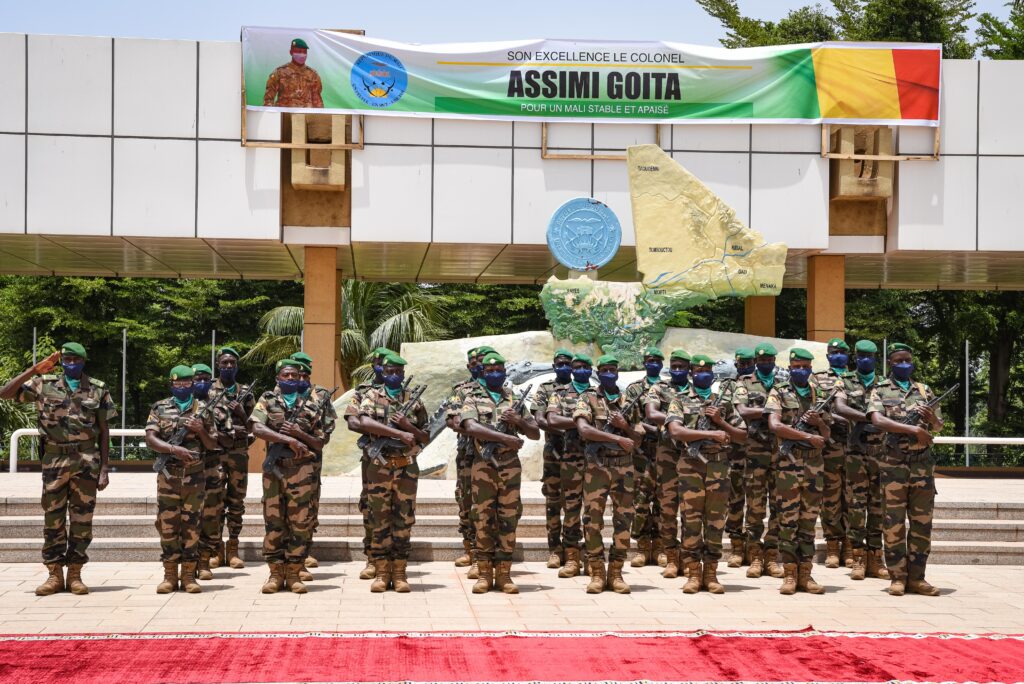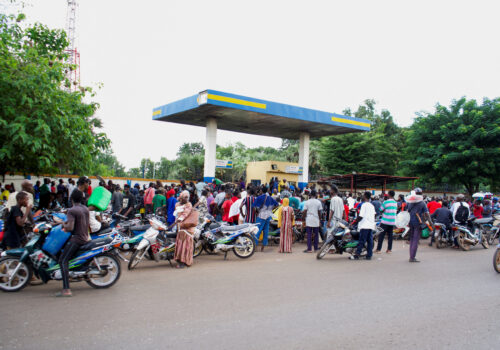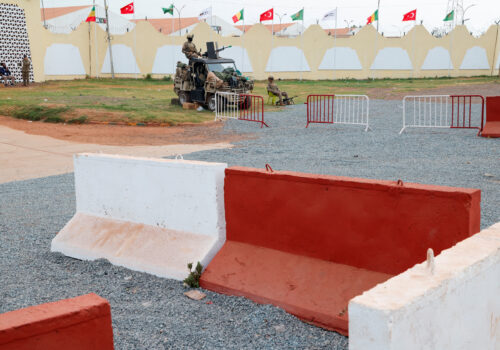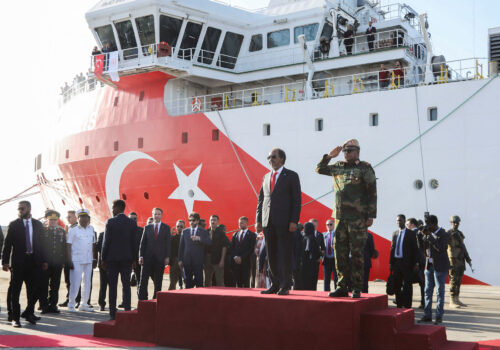Mali’s military regime may be on the brink of collapse after a months-long siege of Bamako by al-Qaeda aligned terrorists, Jama’at Nusrat al-Islam wal-Muslimin (JNIM). A major nationwide fuel crisis in the landlocked state, due to a blockade (which JNIM expanded on November 1) of fuel imports that must travel along major highways patrolled by militants, forced Mali to close schools from late October to mid-November. On November 7, France joined the United States and United Kingdom in urging their citizens to leave the country, while the US embassy evacuated non-emergency personnel and families.
On November 18, the United Nations (UN) secretary general briefed the UN Security Council on “a moment of profound urgency” and the risk of “a disastrous domino effect” across West Africa and the Sahel. The ongoing blockade is an escalation by JNIM, with the group extending its reach further south than ever before. It is possible that the blockade forces the junta, led by Mali’s President Assimi Goïta, to the negotiating table, or in a replay of 2012 events, militant advances could provoke a coup d’état. A JNIM seizure of power, though less likely, is possible—and threatens to turn Mali into Africa’s Afghanistan, similar to the Taliban’s takeover of Kabul in 2021, where terrorists can train, operate, and plan freely in a safe haven.
How did the situation arrive here? And what are the implications of a jihadist takeover in Mali? A JNIM takeover in Mali would represent the first time an al-Qaeda affiliate had taken power in a country, with major regional and underappreciated global implications. This strategic turning point in Mali’s decade-long insurgency could, in the short term, mark the beginning of the end of the Alliance of Sahel States (AES) between Mali, Burkina Faso, and Niger, as well as Russian influence in the region. In the long term, a JNIM regime heightens risks of transnational terror.
A jihadist takeover is now on the board
Since 2012, Mali has suffered three military coups (in 2012, 2020, and 2021) and an escalating separatist-turned-Islamist insurgency. Domestic insecurity contributed to growing public and military unrest that led to the ouster of two democratically elected presidents, Amadou T. Touré and Ibrahim B. Keïta.
Attempts to restore democracy and stability have only had temporary successes since. In 2012, major population centers fell to Islamists and Tuareg rebels who sought to establish a regime in the north (sometimes referred to as the “Azawad” by some northern groups). French intervention with Operation SERVAL in 2013 saved Mali’s government and prevented extremists from moving further south on Bamako. The UN launched the Multidimensional Integrated Stabilization Mission in Mali in 2014 to bolster stabilization efforts.
In 2017, a conglomerate of four smaller organizations, including al-Qaeda in the Islamic Maghreb (AQIM), merged to form JNIM. Problematically, the security situation worsened in spite of the presence of UN and French forces, prompting calls for the West to leave Mali after the 2020 and 2021 coups. Ultimately, both France and the UN withdrew their forces, as Malian protestors waved Russian flags and called for Moscow’s support. They got it. By 2022, the Russian private military Wagner Group became Mali’s principal security partner. Human rights abuses and armed conflict only increased.
In 2024, Mali was ranked fifth among countries most affected by terrorism in the Global Terrorism Index. Armed conflict in Mali caused at least 1,900 fatalities last year, the third-highest figure on record (behind 2022 and 2023). JNIM expanded its geographical reach in central, northeast, and southern Mali. With the army and Wagner Group unable to protect many communities, pro-government Dozo militias have mobilized for self-defense across central Mali, often exacerbating insecurity. Army and Dozo operations to combat the fuel blockade brought record levels of violence and mass atrocities to Mali’s Segou and Sikasso regions last month.
The beginning of the end of the Sahel alliance
Burkina Faso and Niger have similar stories—a poor security environment as a result of JNIM and ISIS-Sahel attacks, military coups, and a fragile post-coup political environment as juntas repudiated Western security assistance and turned to Russian forces (initially Wagner Group, which morphed into Russia’s Africa Corps).
In September 2023, the three countries withdrew from the long-standing regional body, the Economic Community of West African States (ECOWAS), and in its place established the AES, a defense pact to defeat jihadists and maintain power. The fall of Bamako would lead one of three core members to leave the Sahel alliance; the rump Burkina-Niger axis would be imperiled and on the defensive.
A setback for Russia in the Sahel
Although JNIM sees itself as an alternative to “puppets of the West,” a JNIM takeover would first and foremost see Russia’s star over the Sahel dim. JNIM, which has been fighting Russian mercenaries for years, will not be lining up to deal with Russian President Vladimir Putin.
The failure of the AES and Russia to defend Mali serves as a cautionary tale that Russian intervention often exacerbates conflicts on the ground. Ditching security cooperation with Western democracies for Russia’s Africa Corps in the name of national sovereignty may have been popular, but it is a losing strategy.
Russia’s influence across the African Sahel has expanded since 2017, with Russian forces arriving in Burkina Faso in January 2024 and Niger in May 2024. Russia will not receive such invitations from others at this rate.
Inviting the French back in may be out of the question in light of public opinion in the Sahel on French intervention, but regime change in Mali by either a rival military faction or JNIM extremists might provide a window of opportunity for the United States to bolster cooperation with eager states outside of the Sahel alliance—especially among the West African littorals and Mali’s neighbors.
Risks of state-sponsored terrorism in Africa
If there is one group to watch on the continent other than al-Shabaab (one of al-Qaeda’s most competent branches that once had a pilot in flight training for a 9/11-style attack), it’s JNIM. If it were to capture the state apparatus in Mali, the country could easily become a haven for jihadists in the region and become a leading state sponsor of terrorism on the continent, much like Sudan became after Islamists (Muslim Brotherhood affiliate National Islamic Front) came to power following a 1989 coup.
Many terrorist groups in Africa that have pledged allegiance to al-Qaeda senior leadership or ISIS remain fixated on local grievances despite rebranding—but JNIM has the potential to evolve given its al-Qaeda identity is baked into its roots. JNIM’s DNA is comprised in part of an organization, AQIM, that, despite also having local gripes, had leadership (though now deceased) that fought the Soviets in Afghanistan and had historical links to Osama bin Laden. JNIM maintained its allegiance to al-Qaeda senior leadership and maintained AQIM’s relevance and reach in the Sahel with a newer, larger, and more lethal brand under the leadership of Iyad al-Ghali.
Countries beyond the Sahel could become targets, and JNIM could expand its area of influence. At the end of October, JNIM claimed responsibility for its first attack in Nigeria, which killed a Nigerian soldier. It is worth noting that a Boko Haram spinoff, Ansaru, operates not terribly far from where this attack occurred—this group was once believed to have a connection to AQIM, though to what extent is unclear.
Bamako faces a stronger enemy than ever, but unlike in 2013, it now lacks Western support to defeat it. The African Union offers rhetorical support, but no boots on the ground. Military support from ECOWAS seems like the only plausible intervention. Despite the Sahel alliance rebuking Mali, Niger, and Burkina Faso’s membership earlier this year, ECOWAS offered to keep the door for reengagement open. If there is a lifeline, Bamako should grab it. If left unchecked, JNIM could grow bolder, bigger, acquire additional affiliates, and, one day, sponsor or enable operations beyond the region.
Haleigh Bartos is an associate professor of the practice in the Carnegie Mellon Institute for Strategy and Technology at Carnegie Mellon University. She teaches courses on policy writing and national security at Carnegie Mellon University.
John Chin is an assistant teaching professor of political science in the Carnegie Mellon Institute for Strategy and Technology at Carnegie Mellon University. He is the lead author of the Historical Dictionary of Modern Coups D’état, which was named one of the best historical materials published in 2022–2023 by the American Library Association.
Further reading
Fri, Oct 31, 2025
Mali has not just plunged into crisis. It has been unraveling for years.
AfricaSource By
Mali’s crisis runs deeper than recent coups. Military fragmentation, jihadist expansion, and severed international ties have left the landlocked nation isolated, economically strained, and socially fractured.
Wed, Nov 19, 2025
Why Ankara’s rising power in the Sahel could benefit the West
Issue Brief By Alp Ozen, Haley Nelson
Turkey offers a rare channel in the Sahel that the West could use to recalibrate its approach to the region.
Wed, Sep 10, 2025
To counter Chinese and Russian influence in Africa, Turkey could be a decisive ally for the US and Europe
AfricaSource By Rama Yade, Defne Arslan
As Turkey continues to develop closer ties to African nations, the United States and Europe should work with Turkey as a partner in its efforts to gain soft power throughout the continent.
Image: Soldiers of the Malian army (FAMa) during the inauguration ceremony of the president of the transition, Colonel Assimi Goita, which took place this Monday, June 7, at the International Conference Center of Bamako (CICB). - 07/06/2021 - Mali / Bamako District / Bamako - Nicolas Remene / Le Pictorium. NO USE RUSSIA




